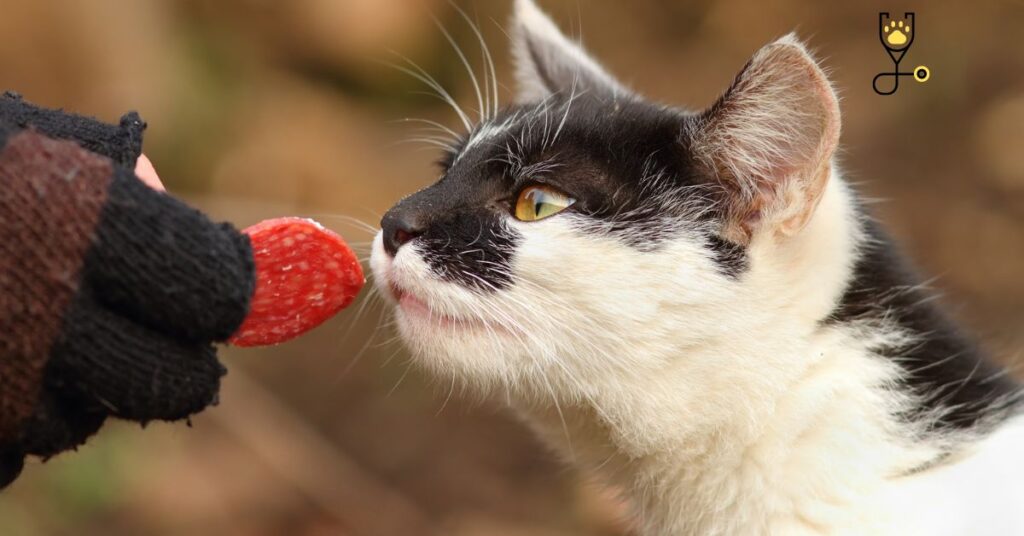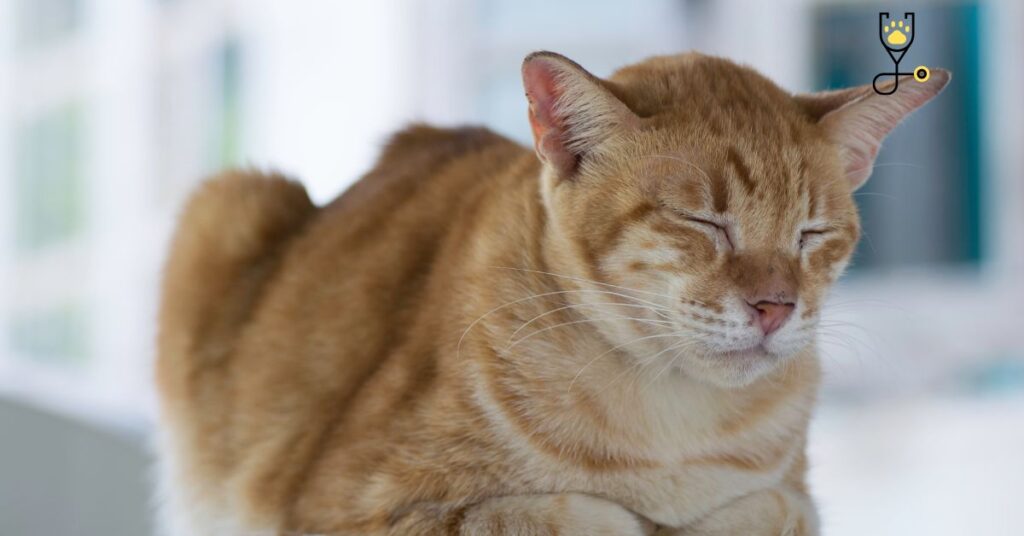Cats are obligate carnivores, which means that their bodies are designed to digest and use only animal-based proteins. This is why cats often have a strong aversion to plant-based foods, and it’s also why you should never feed your cat any kind of human food. But what about salami? Can cats eat salami? The answer may surprise you. Keep reading to learn more.
What is Salami?
Salami is a type of cured meat that is typically made from pork, beef, or a combination of the two. It is seasoned with various spices and then fermented and air-dried. This process gives salami its characteristic flavor and texture. Salami is often used as an ingredient in sandwiches or as a snack food. So, can cats eat salami? Let’s take a closer look at the ingredients in salami to find out.

Ingredients in Salami
- Pork
- Beef
- Spices
- Fermented
- Air
you can see, the main ingredients in salami are meat and spices. There is no plant matter present. This means that, from a nutritional standpoint, salami should be safe for cats to eat. However, there are a few things to keep in mind. First of all, salami is cured meat. This means that it has been treated with chemicals and preservatives. While these substances are safe for humans to consume, they may not be safe for cats. Secondly, salami is high in fat. While some fat is necessary for a cat’s diet, too much fat can lead to obesity and other health problems. For these reasons, it is best to feed your cat salami in moderation.
Learn More: Can Cats Eat Tuna?-Researched Guide
How to Feed Your Cat Salami
If you decide to feed your cat salami, there are a few things you should keep in mind. First of all, only give your cat a small amount. A few bites of salami should be plenty. Secondly, remove the fat from the meat before giving it to your cat. Fat is not good for cats and can cause health problems if consumed in large quantities. Finally, make sure that the salami you give your cat is fresh. Cured meats can harbor bacteria that can make your cat sick. If you have any concerns about feeding your cat salami, speak with your veterinarian. The Bottom Line So, can cats eat salami? The answer is yes, but only in moderation. Salami is safe for cats to eat, but it is high in fat and should only be given in small quantities. If you have any concerns about feeding your cat salami, speak with your veterinarian.

Health Benefits of Salami for Cats
1. Salami is a good source of protein for cats.
2. Salami is low in carbs, which is ideal for cats.
3. The fat content in salami can help keep cats’ coats healthy and shiny.
4. Salami can be a good treat for cats who are finicky eaters.
5. Salami is easy to digest for cats.
Drawbacks of Feeding Salami to Cats
1. Salami is high in fat, which can lead to obesity and other health problems in cats if consumed in large quantities.
2. Cured meats like salami can harbor bacteria that can make your cat sick.
3. The chemicals and preservatives used to cure salami may not be safe for cats.
4. Salami is not a complete and balanced food for cats and should only be given in moderation.
5. Some cats may be allergic to pork or beef, which are the two main ingredients in salami. If you suspect your cat is allergic to either of these ingredients, do not feed them salami.

As you can see, there are both benefits and drawbacks to feeding salami to your cat. If you decide to feed your cat this treat, make sure to do so in moderation and remove the fat from the meat before giving it to your cat. If you have any concerns about feeding your cat salami, speak with your veterinarian.
Warnings
1. Do not feed your cat salami if they are allergic to pork or beef.
2. If your cat has health problems, speak with your veterinarian before feeding them salami.
3. Always remove the fat from the meat before giving it to your cat.
4. Feed your cat salami in moderation to avoid weight gain and other health problems.
5. Make sure the salami you give your cat is fresh to avoid bacteria contamination.
As you can see, there are a few things to keep in mind if you decide to feed your cat salami.
Conclusion
In conclusion, cats can eat salami, but it is best to feed it to them in moderation. Salami is high in fat and should only be given to cats in small quantities. Additionally, make sure to remove the fat from the meat before giving it to your cat, and only give them fresh salami to avoid bacteria contamination. If you have any concerns about feeding your cat salami, speak with your veterinarian.
Frequently Asked Questions
1. Is salami bad for cats?
No, salami is not inherently bad for cats. However, it is high in fat and should only be given to them in small quantities. Additionally, make sure to remove the fat from the meat before giving it to your cat, and only give them fresh salami to avoid bacteria contamination. If you have any concerns about feeding your cat salami, speak with your veterinarian.
2. Can cat eat cured meats?
Cured meats can harbor bacteria that can make your cat sick, so it is best to avoid feeding them these types of meats. If you do decide to feed your cat cured meats, make sure to do so in moderation and remove the fat from the meat before giving it to your cat.
3. What are the benefits of feeding salami to cats?
Salami is a good source of protein for cats and is low in carbs. Additionally, the fat content in salami can help keep cats’ coats healthy and shiny. Finally, salami can be a good treat for cats who are finicky eaters.
4. Are there any drawbacks to feeding salami to cats?
Yes, there are some drawbacks to feeding salami to cats. Salami is high in fat, which can lead to obesity and other health problems in cats if consumed in large quantities. Additionally, cured meats like salami can harbor bacteria that can make your cat sick. The chemicals and preservatives used to cure salami may not be safe for cats either. Finally, since salami is not a complete and balanced food for cats, it should only be given in moderation.
5. I think my cat is allergic to pork or beef. Should I still feed them salami?
If your cat is allergic to pork or beef, do not feed them salami. These are the two main ingredients in this cured meat, and your cat could have a reaction if they consume it. If you think your cat may be allergic to either of these ingredients, speak with your veterinarian.







